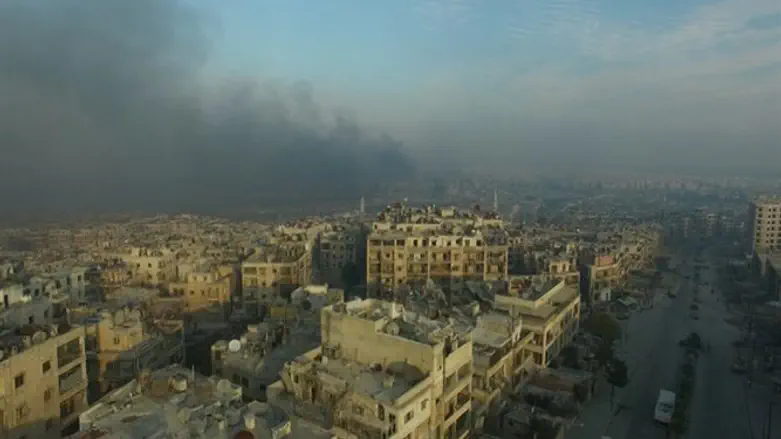
Syrian government forces carried out at least eight chemical attacks during the final weeks of the battle for Aleppo, killing nine people including four children, Human Rights Watch (HRW) said Monday, according to AFP.
The group said it interviewed witnesses, collected photos and reviewed video footage indicating that chlorine bombs were dropped from government helicopters during the offensive from November 17 to December 13.
Around 200 people were injured by the toxic gases used on opposition-controlled areas of the northern city, it said.
The HRW report said one of the deadliest bombings hit the neighborhood of Sakhur on November 20, killing six members of the same family, including four children.
It further detailed attacks on a playground, clinics, residential streets, and houses that left scores of people struggling to breathe, vomiting and unconscious.
"The chemicals would affect the children most severely... they inhale these smells and they end up suffocating," said a first responder quoted in the report.
The attacks, which may have involved as many as three helicopters operating jointly, took place in areas where government forces were poised to advance, said the rights group.
"The pattern of the chlorine attacks shows that they were coordinated with the overall military strategy for retaking Aleppo, not the work of a few rogue elements," said Ole Solvang, HRW's deputy emergencies director.
The actual number of chemical attacks could be higher, said the group, adding that journalists, medical personnel and other credible sources had reported at least 12 attacks in that period.
HRW was able to verify eight attacks involving chlorine bombs.
Both the regime of Syrian President Bashar Al-Assad and the Islamic State (ISIS) group have been accused of unleashing chemical weapons during the conflict.
A panel set up by the UN, known as the Joint Investigative Mechanism (JIM), has already determined in a year-long probe that Syrian government forces carried out three chlorine gas attacks on villages in 2014 and 2015.
The JIM probe was the first time that an international inquiry had pointed the finger of blame at Assad and his forces, after years of denial from Damascus.
Syria denies using chemical weapons during the civil war, claiming that the allegations are "a campaign of lies" made by “Western circles”.
Syrian forces, backed by Russia, launched an offensive in November to seize east Aleppo, a key battleground in the war, and the regime announced on December 22 that it had taken full control of the city.
HRW said there was no evidence that Russia was directly involved in the chemical attacks, although Russian aircraft did play a role in the military offensive against opposition fighters in east Aleppo.
Chlorine use as a weapon is banned under the Chemical Weapons Convention, which Syria joined in 2013 under pressure from Russia.
As part of a deal brokered by the United States and Russia, Syria agreed to hand over its chemical stockpile to the Organization for Prohibition of Chemical Weapons (OPCW) for destruction. Since then, however, the OPCW has determined that chlorine has been "systematically and repeatedly" used as a weapon.
The use of chlorine bombs as an indiscriminate weapon could amount to war crimes, noted AFP.
Human Rights Watch urged the Security Council to impose sanctions on senior leaders in the chain of command, though such a move would likely be vetoed by Russia.

